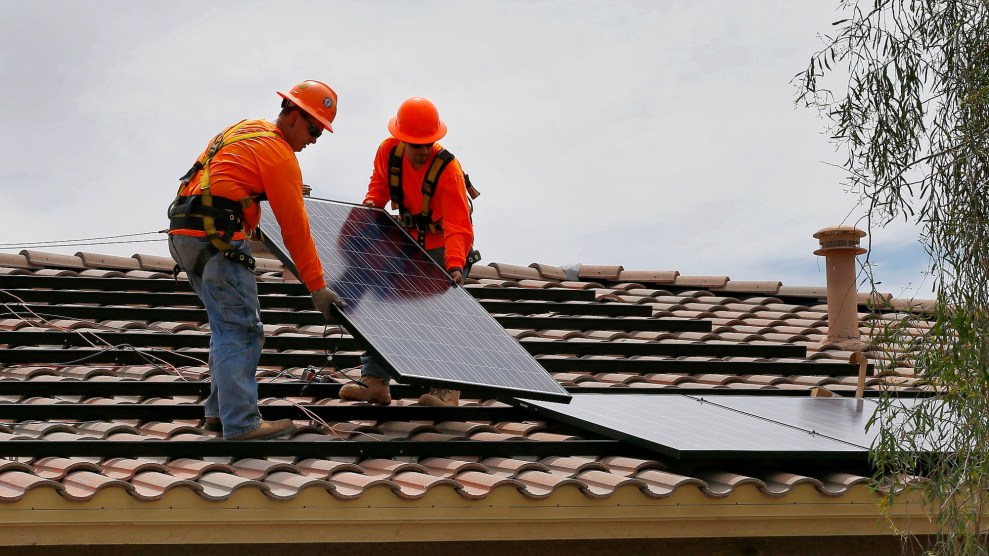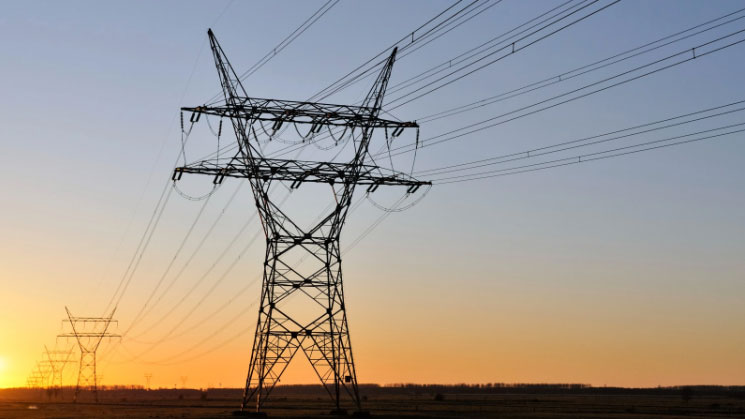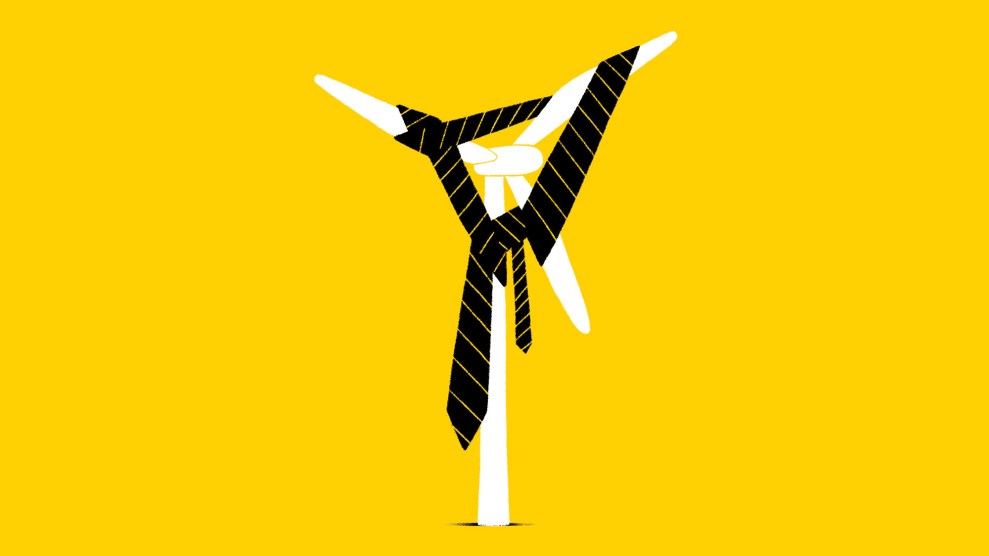
Electricians install solar panels on a roof in Goodyear, Ariz.Matt York/AP
This story was originally published by Inside Climate News and is reproduced here as part of the Climate Desk collaboration.
In a hearing last month in Arizona, an expert witness for the state’s largest utility said he agrees with the idea that utilities oppose rooftop solar because it is a threat to their profits.
If ever there was an occasion for a “record scratch” sound effect to be played at a regulatory hearing, this was it.
The comment was stunning because it’s something renewable energy advocates have long been saying but that utilities have danced around.
For me, the statement and the reaction to it shows a need to address a related question: How can the regulatory system be reformed so that the economic interests of utilities can coexist with the need to build lots of rooftop solar and other customer-owned power generation?
The August 25 hearing before state regulators was about a rate increase proposal by the utility, Arizona Public Service. APS called Roger Morin to testify in favor of raising rates. Morin is a consultant who has written about the finances of regulated companies and has spent decades traveling the country to testify on behalf of utilities in cases like the one in Arizona.
He was being cross-examined by Court Rich, an attorney who represents solar companies. Rich used the word “prosumer,” which in this context meant consumers who have their own electricity generation systems.
The following starts at about the 1:09:00 mark in the hearing if you want to see it.
“Would you agree,” Rich said, “that one of the dangers to utility shareholders from the increasing growth of the prosumer is that the investments made by the prosumers with their own money may supplant investments that the utility may otherwise have been able to make and earn a return on, for the benefit of their shareholders?”
Morin said, “It makes it a lot riskier and it’s even much harder to forecast demand, given the uncertain impact of prosumers.”
“OK, so you agree with my statement?” Rich asked.
Morin said, “Yeah, I agree.”
“OK. And in fact, this is one of the many reasons that we’ve seen utilities around the country oppose many customer-sited technologies, correct?” Rich asked.
Morin said, “That is correct.”
Cue the record scratch.
The exchange might have gone unnoticed, but Joe Dana, a reporter for KPNX television in Phoenix, did a story about it. Clips of Morin’s comments then showed up on social media, and were greeted with a mix of surprise and amusement by renewable energy advocates.
I emailed Morin to ask about his testimony, and he referred me to APS. Jill Hanks, an APS spokeswoman, sent me a statement that doesn’t address the substance of what Morin said.
“APS is committed to serving our customers with energy that is reliable, affordable and clean,” she said. “In addition to utility-scale generation, we support customers interested in protecting the environment and reducing their energy bills by installing their own behind-the-meter technologies, like rooftop solar and energy storage systems, at their homes, schools and businesses.”
She said the company now gets 51 percent of its electricity from carbon-free sources and has committed to getting 100 percent carbon-free electricity by 2050. And, she noted that APS has a lot of rooftop solar in its territory, with about 170,000 customer-owned systems.
I asked Rich about his exchange with Morin and he replied with this:
“The entire anti-rooftop solar and anti-customer technology campaign from utilities has always been and will forever be about utilities trying to protect their bottom line from utility customers that are looking to take greater control of their own energy destiny,” he said in an email. “Utilities like to misdirect and set up counter-narratives to try to plausibly argue they are not fighting their own customers just to protect utility profits, but as Dr. Morin makes clear, it’s all about the money for the utilities.”
I’ve written about utilities for a long time and seen how companies obfuscate when talking about their stance on rooftop solar. Utilities will often support policies that put caps on how much rooftop solar can be built, or, as a fallback, reduce the financial benefits of solar by coming up with new charges and modifications to rates. Despite these actions, the companies say they support rooftop solar, or at least do not oppose it.
Utilities have a good reason to oppose rooftop solar. The growth of customer-owned electricity generation will reduce the need for services from the utility, undercutting profits. If profits take a hit, then investors won’t want to own the utility’s stock. Investors will get mad. Executives will lose their jobs.
If we want to make a smooth transition to clean energy, it will need to include a mix of utility-scale renewable energy sources (which utilities like) and customer-owned sources (which utilities don’t like). And, something needs to change so that utilities feel less of a need to impede customer-owned sources.
John Farrell, co-director of the Institute for Local Self-Reliance in Minnesota, has spent a lot of time thinking about this challenge, and I knew he’d have some thoughts on the comments in the APS case.
“I think the investor-owned utility model is broken, because the incentives that we give them lead them exactly down the path you’d expect from that APS witness,” he said. “There’s a litany of things that we can talk about as examples of how when you keep giving them the wrong incentives, they’re going to keep behaving in exactly the way that you expect, which is to fight competition from things that we want.”
He has written about the shortcomings of investor-owned utilities and the need to align utilities’ incentives with the kind of conduct that is most beneficial to society. One option is for the public to take over their utilities and convert them into nonprofits, which usually involves legislation or a referendum. Another is for state legislators to change the law to tie utilities’ incomes to performance standards on things like expanding rooftop solar and improving fire safety.
Until such changes, we will see examples big and small of utilities using their vast resources to hinder the growth of customer-owned generation. Farrell has seen this so often and for so long that he’s almost numb to it. (On a recent episode of his Local Energy Rules podcast, he put the spotlight on a situation in Rhode Island in which the Episcopal Diocese is suing the local utility to challenge charges for installing solar at a church camp.)
So what does Farrell think of Morin’s testimony?
“It’s wonderful that somebody actually is telling the truth out loud on the utility side,” he said. “I guess maybe we’ve all just become too cynical that we expect they never will tell the truth out loud because they have every incentive not to do it.”















